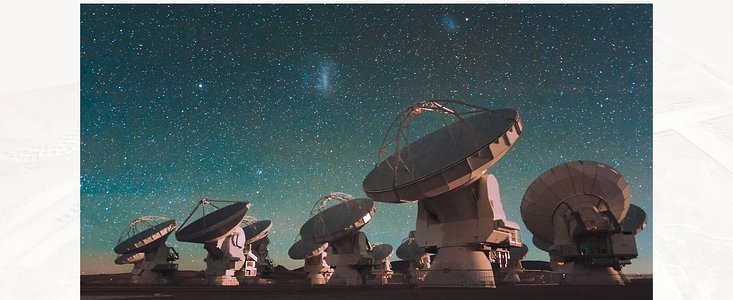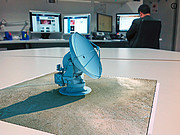Anuncio
ESO incursiona en el territorio de la realidad aumentada con la nueva aplicación ALMA para Tablets y Smartphones
16 de Abril de 2014
Gracias a una nueva aplicación desarrollada en conjunto con la empresa polaca Bridge, el Atacama Large Millimeter/submillimeter Array (ALMA) aparecerá frente a sus ojos en 3D, a través de su tablet o Smartphone, mediante un archivo PDF, conocido como rastreador.
La aplicación puede utilizarse con fines recreativos, como asimismo como herramienta educativa, a fin de aprender más acerca de ALMA al visualizar el conjunto de 66 antenas con tan sólo tocar su pantalla. Al acercarse con la cámara a un grupo de antenas seleccionadas, podrá apreciar detalles en un modelo tri-dimensional.
Para bajar la aplicación de realidad aumentada de ALMA, sin costo, le rogamos visitar Google Play y el iTunes AppStore. El documento rastreador se encuentra disponible también en formato PDF en las páginas web de ESO.
ALMA consiste en un conjunto de 66 antenas dispuestas sobre un área de 16 Kms., en el Llano de Chajnantor, a 5.000 metros de altura, en el norte de Chile. Es el telescopio más poderoso que existe para observar el Universo frío. El conjunto ALMA fue inaugurado en marzo del 2013.
Bridge es una empresa dedicada al diseño y a la investigación tecnológica, que trabaja sobre la tecnología de la realidad aumentada.
Información Adicional
El Atacama Large Millimeter/submillimeter Array (ALMA), es una instalación astronómica internacional, y una colaboración entre Europa, América del Norte y Asia Oriental, en cooperación con la República de Chile. ALMA está financiado en Europa por el Observatorio Europeo Austral (ESO), en América del Norte por la Fundación Nacional de Ciencias de los Estados Unidos (NSF) en cooperación con el Consejo Nacional de Investigación de Canadá (NRC); en Japón por los Institutos Nacionales de Ciencias Naturales en cooperación con la Academia Sinica (AS) en Taiwán. La construcción y operación de ALMA están dirigidas por ESO en representación de Europa, por el Observatorio Nacional de Radioastronomía (NRAO) -gestionado por Associated Universities, Inc. (AUI)- en representación de América del Norte; y por el Observatorio Astronómico Nacional de Japón (NAOJ) en representación de Asia Oriental. El Observatorio ALMA o Joint ALMA Observatory (JAO) proporciona al proyecto la unificación tanto del liderazgo como de la gestión de la construcción, puesta a punto y operación de ALMA.
Enlaces
- Aplicación de Realidad aumentada ALMA en Google Play ALMA augmented reality app in Google Play
- ALMA augmented reality app in the AppStore (Realidad aumentada ALMA en AppStore)
- PDF tracker (Rastreador en PDF)
- Bridge
- More about ALMA (Información adicional acerca de ALMA)
- Photos of ALMA (Fotografías de ALMA)
- ESO ALMA science page (Página científica ESO ALMA)
- ALMA Science Portal at ESO (Portal científico de ALMA en ESO)
- European ALMA Regional Centres (Centros Regionales de ALMA para Europa)
Contactos
Oana Sandu
Coordinadora para la Comunidad
Departamento de Educación y Difusión ESO
Tel: +49 89 320 069 65
Email: osandu@partner.eso.org
Sobre el anuncio
| Identificador: | ann14031 |
Our use of Cookies
We use cookies that are essential for accessing our websites and using our services. We also use cookies to analyse, measure and improve our websites’ performance, to enable content sharing via social media and to display media content hosted on third-party platforms.
ESO Cookies Policy
The European Organisation for Astronomical Research in the Southern Hemisphere (ESO) is the pre-eminent intergovernmental science and technology organisation in astronomy. It carries out an ambitious programme focused on the design, construction and operation of powerful ground-based observing facilities for astronomy.
This Cookies Policy is intended to provide clarity by outlining the cookies used on the ESO public websites, their functions, the options you have for controlling them, and the ways you can contact us for additional details.
What are cookies?
Cookies are small pieces of data stored on your device by websites you visit. They serve various purposes, such as remembering login credentials and preferences and enhance your browsing experience.
Categories of cookies we use
Essential cookies (always active): These cookies are strictly necessary for the proper functioning of our website. Without these cookies, the website cannot operate correctly, and certain services, such as logging in or accessing secure areas, may not be available; because they are essential for the website’s operation, they cannot be disabled.
Functional Cookies: These cookies enhance your browsing experience by enabling additional features and personalization, such as remembering your preferences and settings. While not strictly necessary for the website to function, they improve usability and convenience; these cookies are only placed if you provide your consent.
Analytics cookies: These cookies collect information about how visitors interact with our website, such as which pages are visited most often and how users navigate the site. This data helps us improve website performance, optimize content, and enhance the user experience; these cookies are only placed if you provide your consent. We use the following analytics cookies.
Matomo Cookies:
This website uses Matomo (formerly Piwik), an open source software which enables the statistical analysis of website visits. Matomo uses cookies (text files) which are saved on your computer and which allow us to analyze how you use our website. The website user information generated by the cookies will only be saved on the servers of our IT Department. We use this information to analyze www.eso.org visits and to prepare reports on website activities. These data will not be disclosed to third parties.
On behalf of ESO, Matomo will use this information for the purpose of evaluating your use of the website, compiling reports on website activity and providing other services relating to website activity and internet usage.
Matomo cookies settings:
Additional Third-party cookies on ESO websites: some of our pages display content from external providers, e.g. YouTube.
Such third-party services are outside of ESO control and may, at any time, change their terms of service, use of cookies, etc.
YouTube: Some videos on the ESO website are embedded from ESO’s official YouTube channel. We have enabled YouTube’s privacy-enhanced mode, meaning that no cookies are set unless the user actively clicks on the video to play it. Additionally, in this mode, YouTube does not store any personally identifiable cookie data for embedded video playbacks. For more details, please refer to YouTube’s embedding videos information page.
Cookies can also be classified based on the following elements.
Regarding the domain, there are:
- First-party cookies, set by the website you are currently visiting. They are stored by the same domain that you are browsing and are used to enhance your experience on that site;
- Third-party cookies, set by a domain other than the one you are currently visiting.
As for their duration, cookies can be:
- Browser-session cookies, which are deleted when the user closes the browser;
- Stored cookies, which stay on the user's device for a predetermined period of time.
How to manage cookies
Cookie settings: You can modify your cookie choices for the ESO webpages at any time by clicking on the link Cookie settings at the bottom of any page.
In your browser: If you wish to delete cookies or instruct your browser to delete or block cookies by default, please visit the help pages of your browser:
Please be aware that if you delete or decline cookies, certain functionalities of our website may be not be available and your browsing experience may be affected.
You can set most browsers to prevent any cookies being placed on your device, but you may then have to manually adjust some preferences every time you visit a site/page. And some services and functionalities may not work properly at all (e.g. profile logging-in, shop check out).
Updates to the ESO Cookies Policy
The ESO Cookies Policy may be subject to future updates, which will be made available on this page.
Additional information
For any queries related to cookies, please contact: pdprATesoDOTorg.
As ESO public webpages are managed by our Department of Communication, your questions will be dealt with the support of the said Department.



